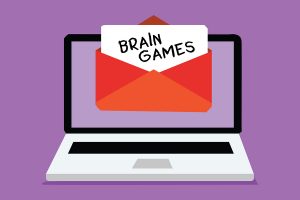 You can’t believe everything you read about the brain on the internet. Beware of brain fitness sites that sell games that claim to make you smarter and protect you from cognitive decline.
You can’t believe everything you read about the brain on the internet. Beware of brain fitness sites that sell games that claim to make you smarter and protect you from cognitive decline.
The popularity of games for the brain isn’t supported by scientific evidence. You may get better at performing that particular game, but it doesn’t translate to the real world. Brain fitness games do, however, show our fascination with mental puzzles.
According to an article in Forbes, brain products are big business. I was shocked to learn that the business of brain health products totals over a billion dollars a year and keeps growing. All over the marketplace, entrepreneurs are hopping on the brain health bandwagon.
Whether it’s software that promises to improve your memory, games that claim to fend off dementia, supplements or foods that fuel brain power, or self-help books and gurus showing how to enhance cognitive function, there’s been an explosion of entrepreneurial investment in brain fitness.
According to a study by SharpBrains, the market for brain health software alone grew from $600 million in annual revenues in 2009 to more than one billion dollars by the end of 2012. The researchers forecast this market to reach four to 10 billion dollars by 2020, with six billion being the most likely scenario.
Beware of the Buzz
The hype is seductive. One author who claims to be a brain expert suggests that, “You don’t have to take a pill or watch a DVD or buy a product to enhance your mental performance. Your mind can be strengthened just like a muscle, and it only takes 100 seconds a day.”
He presents a five-step meditative exercise to build a positive self-image, concluding, “Just as your body responds to consistent strength training, your mind responds to regular mental workouts.”
Oh boy, in just a minute and a half, great! Presto, change-o, brain fitness! Wait, though, there’s no secret here. We’ve known about the positive effect of meditation and affirmations for a long time. No one is disputing this common-sense approach to reinforcing a healthy frame of mind.
But it is a big leap to say you can change your brain or strengthen your mind permanently in a minute and a half. I mention this article because it is an example of how misleading some publications can be when it comes to anything about the brain.
Beware of brain buzz. Not all you read about the brain is based on solid information. (What? Did you think you could do it sitting on your butt in front of the computer?)
The Truth about Brain Fitness
Mental games are good for the brain; they’re just not going to replace the need for physical exercise. Some exercises are better than others for building a better brain.
Those activities requiring multiple movements at the same time are challenging for the brain and contribute to maintaining and growing neurons. For example, dancing requires learning steps, pacing, patterns, and multiple simultaneous body movements. So does tennis, ping-pong, and golf―or most any sport, for that matter. Playing the piano, learning to play a musical instrument, learning a language―these are all especially good for the brain.
Word and math games will keep your mental retrieval skills sharp. Some complex computer games involving multiple players, story simulations, and strategies are great for maintaining brain strength.
All mental activities, but especially challenging ones, are good for brain fitness. In a sense, mental workouts are similar to engaging your muscles. Use it or lose it. But the key is to have stretch goals, for both your body and your brain.
If I followed my own advice—which I occasionally do—I would therefore stop wasting time with Mahjong Solitaire and switch to something more challenging.
What are you doing for your brain?

Recent Comments